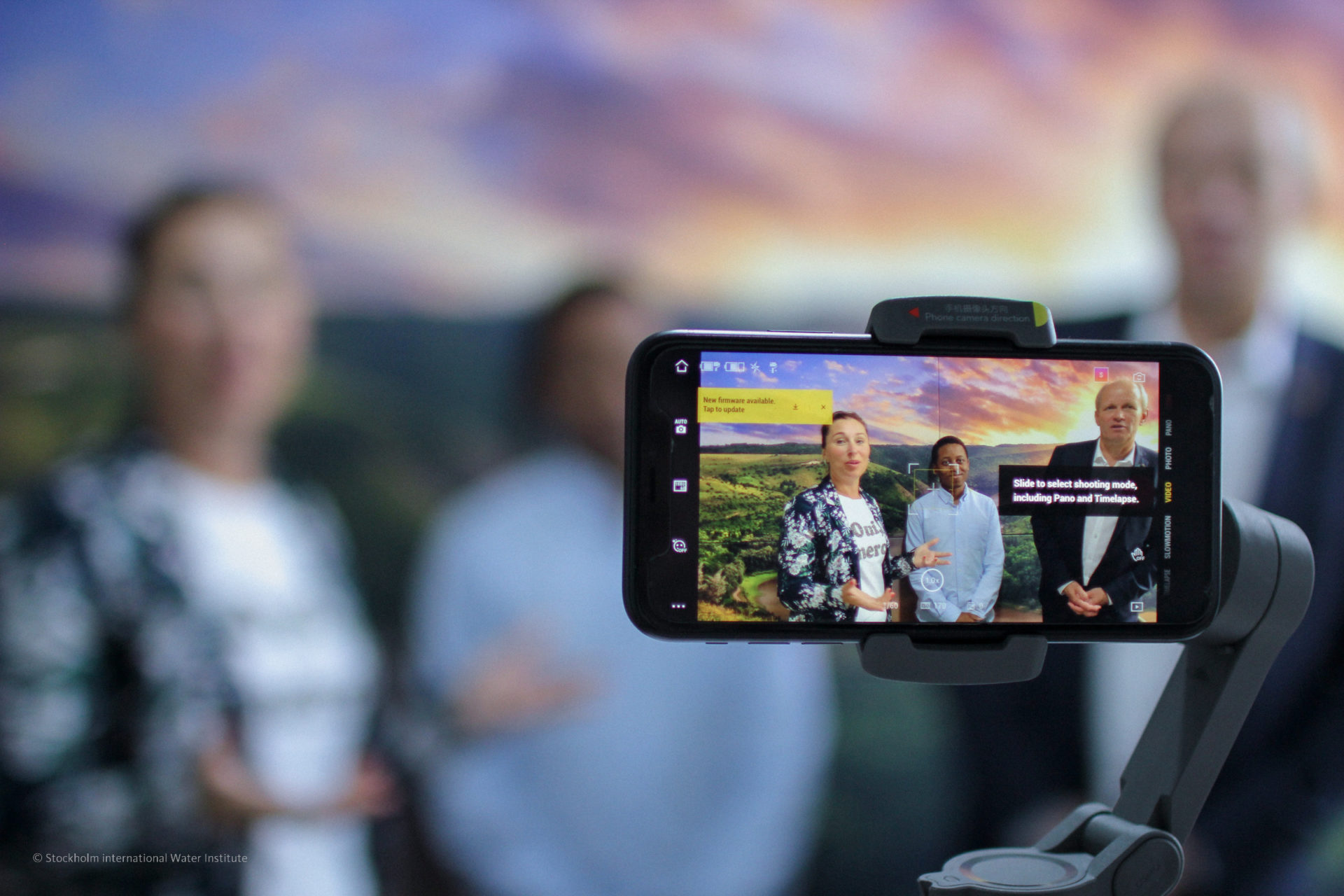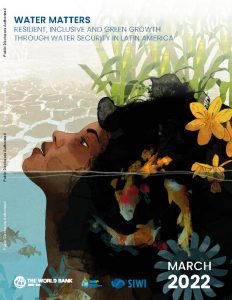- SIWI – Leading expert in water governance
- /
- Latest
- /
- 7 lessons from World Water Week At Home
7 lessons from World Water Week At Home

The background was somber – the online World Water Week At Home event was launched to keep the conversation going after Covid-19 had made it impossible for people to travel to Stockholm for World Water Week. With a shocking pandemic, an escalating climate crisis, and skyrocketing poverty levels, there are plenty of issues that demand immediate action.
But the water and development community rose to the challenge. When World Water Week At Home closed on 28 August, the organizers at SIWI could look back at a week of 120 extremely solutions-focused sessions. Participants from international organizations, universities, governments, cities, and companies had honest discussions about what needs to be done and how they can collaborate.
Here are seven takeaways from SIWI staff who attended different sessions. You can also find interesting background material in the World Water Week At Home programme.
1) Safety is the new top concern.
For the past decades, most global actors have focused on efficiency, with increasingly complex supply-chains crisscrossing the world. But this has also made societies more vulnerable in times of crisis, which Covid-19 has made painfully apparent. To prepare for a much more uncertain and dangerous future, with emerging risks linked to global warming and degraded ecosystems, the new top priority must be safety and resilience.
The next crisis will most likely also be related to water – almost all disasters are – so this creates new expectations on the water community. Awareness of this is rapidly growing, though not fast enough.
The most recent international climate summit, COP25 in Madrid, saw many more countries interested in water-related solutions. During World Water Week At Home, several sessions discussed the preparations ahead of next year’s COP26 and what can make countries work more actively with water in their nationally determined contributions to the Paris agreement. Participants called for a more holistic approach, with increased focus on the role of resilient landscapes and societies.
2) Resilience requires collaboration.
One of the most fascinating aspects of At World Water Week At Home was how people who otherwise don’t meet now got a chance to explore areas where their work intersect. Several sessions for example discussed housing from a variety of perspectives. With an expected addition of two or three billion people to the planet, how their future homes are constructed is an enormous environmental challenge. There is a need for “greener” and less water-consuming building materials, but also for more effective wastewater treatment. And for more solutions that are off-grid, viable even with more waste taken care of directly in the buildings. A new prerequisite is also that houses must be able to withstand the more extreme weather and rising sea levels that will follow from global warming.
This way of looking at housing makes obvious sense from many perspectives. It would save lives and cut costs since extreme weather events would as a result be less harmful to people and buildings, and fewer people would succumb to diseases caused by dirty water. It is also fundamental to protecting the ocean and landscapes from growing flows of pollution.
3) Silos are increasingly dangerous.
What then prevents this necessary collaboration for resilience? Many sessions discussed the risks associated with outdated silos thinking, where no one sees the whole picture, no one is responsible, where it is impossible to pool budgets and decision-making is too fragmented. Growing polarization within countries and a more toxic rhetoric between countries can make collaboration even more difficult, especially in transboundary basins.
The problem is however increasingly acknowledged in discussions on how to implement the Paris agreement on climate change and the 2030 Agenda. If recovery measures after the current pandemic are structured to encourage problem solving beyond boundaries, that could have a great impact. There are models to follow, for example the source-to-sea approach which was highlighted by the Swedish Minister for Environment and Climate Isabella Lövin.
4) We need a business case.
Companies of all sizes described the same problem – they have more solutions than they can sell. If cities and governments would change regulations and opt for greener solutions, we would soon see a booming market for water-smart technology and a wave of new innovations, business representatives argue. Now there are plenty of solutions that would benefit humans and nature but the business case for them is not there yet.
An obvious example is nature-based solutions, which still only attract a fraction of the investments in infrastructure. In the session The business case for financing nature, Gilles Kleitz from the French development agency AFD described this as a classic market failure where decision-makers do not know how to estimate the value of nature. Water specialists and others must be better at explaining the role of water for humans and nature in terms that make it possible to add this perspective to the calculation. There is important work being done here, for example by the 2019 Stockholm Water Prize laureate Jackie King, but it is not sufficiently used. At the same time, Gilles Kleitz also emphasized that the proponents of nature-based solutions must be better at demonstrating that those solutions really work.
5) Time for decisions.
Compared to a few years ago, governments are very much in demand. There is a growing realization that bold decisions by national governments – as well as cities and international institutions – are needed to drive demand and create a better business case for sustainability. During the Covid-19 pandemic, many governments have played an active role in ensuring that low-income households gain or maintain access to water and sanitation, despite economic hardships. SIWI and UNICEF are actively monitoring the situation and it was, of course, an important topic during World Water Week At Home.
In the opening Meet the ministers session, ministers from Colombia and South Africa detailed how they have taken innovative emergency measures to ensure that everyone has access to water during the pandemic. But for both countries, these interventions are part of a long-term strategy. After democracy was introduced, South Africa was early in recognizing water and sanitation as rights of all citizens and services are constantly expanded. In Colombia, low-income citizens can defer their water bills and the government provides subsidies to the water utilities.
This, of course, costs money; Colombia has doubled its infrastructure budget for core water investments. But, as the Dutch Minister of Infrastructure and Water Management, Cora van Nieuwenhuizen, noted in her address to the session, almost all countries will need to make massive investments in their water infrastructure if they are to tackle climate change and meet the Sustainable Development Goals by 2030. This should therefore be a top priority in recovery measures after Covid-19; in addition, it would also create new jobs.
6) Changing behaviour is also about power.
Given that most sessions advocated for rapid changes to the way we live, it was not surprising that the topics of communication and behavioural change kept popping up. Many participants were inspired by the handwashing campaigns in recent months. Others called for more engaging communication to make people aware of why water is fundamental to tackling many of the world’s greatest challenges – an example during the week was how the Dutch government had enlisted a cartoonist to depict some of its sessions.
Communication has to also be about everybody being able to express their opinions without fear. It is about people being able to influence decisions that affect them, regardless of their age or gender or income or sexual orientation or ethnicity. And behavioural change campaigns rely on people having the power to change.
There is an important gender dimension to this, as discussed for example in the session Advancing Climate and Water Resilience for Cotton and Textile. Prerna Kumar from the International Center for Research on Women described the situation for many women working in the textile sector in countries like India and Bangladesh and rural women in the same areas. In a recent study, more than half of the women interviewed said that they did not have any influence at all on matters in the household that concern them. Yet they bore the main responsibility for fetching water and numerous other chores.
7) What do we value?
Discussions during World Water Week At Home often ended up being about values. The Covid-19 pandemic has shown that rapid change is possible when people set their mind to it, so why can’t the same determination be summoned to achieve the sustainable development goals and tackle climate change? For example, by channelling recovery resources to long-term resilience. As mentioned in a keynote address by the President of Senegal, we need a new paradigm.
Many World Water Week At Home participants feel that the response to the current crisis has so far been inadequate, leaving too many of the problems for young and future generations to solve. There is however a growing youth movement for water that also was visible during the Week. One example was in the session Solving the water climate puzzle by connecting youth stories and decision-makers. Doaa Osman from Sudan shared insights from the important work of the Sudan Youth Parliament for Water, which since its foundation in 2016 has attracted 1,700 members across the country, 38 per cent of whom are women. Arun Krishnamurthy, who has founded the Environmentalist Foundation of India, talked about their innovative community-based approach to restoring lakes.
The Stockholm Junior Water Prize finalists also demonstrated amazing knowledge and creative ideas that can improve both the lives of humans and the health of the planet. These young people know that they cannot take water for granted, as previous generations have sometimes done. They innovate for a world marked by water scarcity and growing pollution. But at their disposal, they have an unprecedented level of technology and scientific knowledge. With that, it is possible to solve major challenges, if we choose to do so.
It all comes down to how we value water, and this will be the main topic of the forthcoming World Water Weeks in 2021 and 2022.









